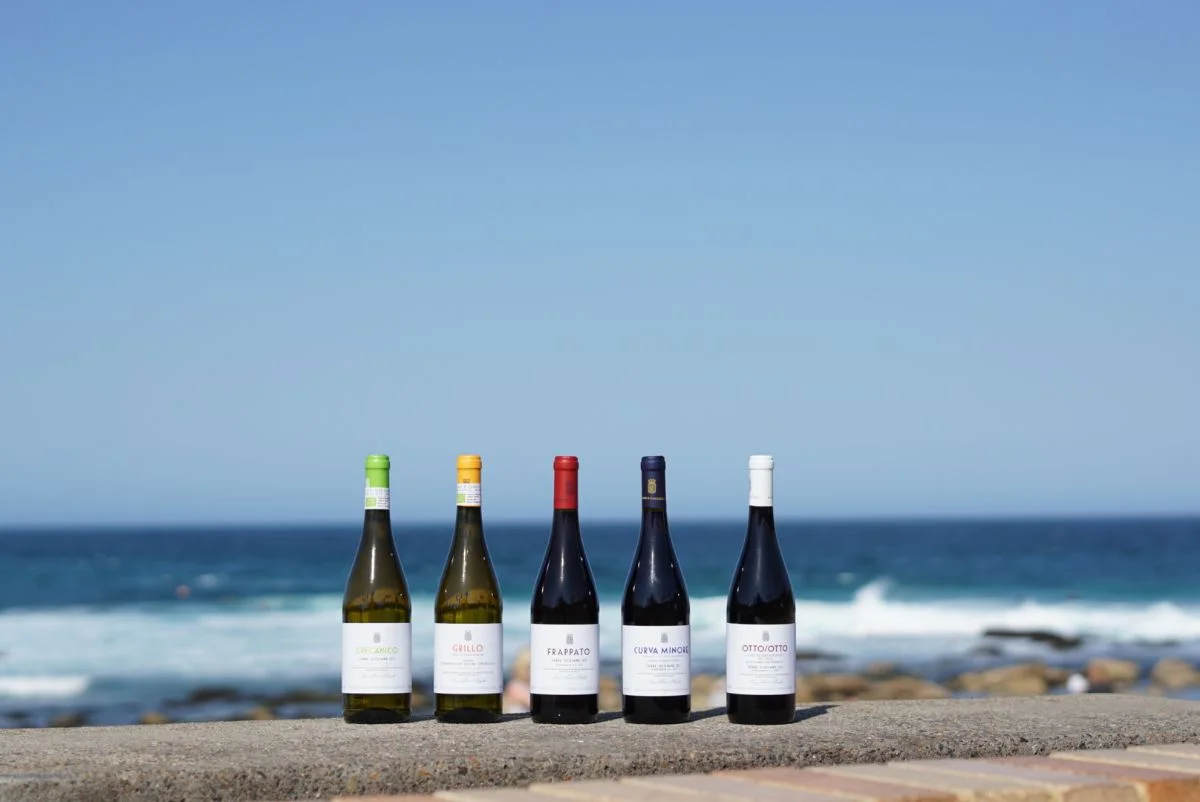Baron di Pianogrillo
By Lorenzo Piccione
Chiaramonte Gulfi, Ragusa, Sicily
In a hilltop city of south-east Sicily, an ancient castle overlooks the lush surroundings of the Pianogrillo estate. A man of many trades, Lorenzo is a master of not only organically farmed wine and olive oil, but is a concert pianist and artist too.
Set at 480m above sea level, the dry grown bush vines grow on predominately limestone and clay soils, benefitting from the warm Sicilian days and feeling the cool breeze on summer evenings allowing for consistent ripening and acid retention. Lorenzo prides himself on sustainable farming methods, and as such, his vineyards and winery are certified organic.
An endangered breed of protected Sicilian swine wander the land that has belonged to Pianogrillo barons for centuries, Lorenzo being the remaining descendant of this line. The herd of locals and some horses are free to graze amongst the 14 acres of vines that produce Frappato, Nero d’Avola, Grillo and Grecanico. Lorenzo and his team's dedication to sustainability of the ancient land they farm is unwavering, and this produces wonderful expressions of the region and varietal.
Vine pruning and training systems: Guyot, Alberello a pedale d’olivo, Cordone speronato (spurred cordon), Alberello (derived from ancient Greek viticultural techniques - the vines have no wires or support and grow low and densely in the vineyard)
Wild ferments, zero adjustments, corrections or additions minus small doses of SO2 at bottling; displaying purity of fruit, vigour, texture, salinity and minerality.
Bellissimo x
2017 Baroni di Pianogrillo Grecanico
Certified organic, Grecanico from the Pianogrillo estate in Sicily was planted in 1990 on limestone soils and is elevated at 300m above sea level. The grapes were hand harvested, and underwent wild primary fermentation in stainless steel with gentle stirring at controlled low temperatures for 3 weeks to retain fruit purity and delicate aromatics.
The wine underwent partial malolactic fermentation in stainless steel vessels to retain freshness and remained in stainless for 6 months to settle before going to bottle.
Unfined, with a light filtration
10ppm total SO2
9000 bottles produced
2017 Baroni di Pianogrillo Grillo
From south-east Sicily's Chiaramonte Gulfi region in the province of Ragusa, this 100% Grillo came from vines that were planted in 2000 on limestone soils at 470m above sea level.
Certified organic, Grillo was hand picked as wholebunches where a short carbonic maceration of 2.5 days occurred followed by wild primary fermentation in stainless for a total of 10 days with minimal stirring occurring. Followed by full malolactic fermentation, the wine was left to settle for 6 months on lees in stainless before being racked to bottle.
Unfined, with a light filtration
20ppm total SO2
15,000 bottles produced
2017 Baroni di Pianogrillo Frappato
Frappato from the Pianogrillo vineyard was planted in 1990, and grows on a combination of limestone and clay soils elevated at 300m above sea level.
Certified organic, the fruit was hand harvested, de-stemmed, and underwent wild primary fermentation in stainless steel macerating on skins for 5 days with minimal punch downs occurring once daily. The wine was racked to old Sicilian chestnut oak where malolactic fermentation occurred and maturation for 6 months before going to bottle.
Unfined, with minimal filtration
10ppm total SO2
8000 bottles were produced
2015 Baroni di Pianogrillo ‘Curva Minore’
Frappato and Nero D’Avola (50% Frappato, 50% Nero D’Avola) vines were planted in 1991 and grow on limestone and clay soils. This blend is typical of eastern Sicilian territory and the Ragusa region.
Certified organic, the grapes were hand harvested, destemmed and spent 5 days on skins with minimal punch downs occurring for a gentle phenolic extraction. Pressed to stainless steel where a wild fermentation occurred, the resulting wine was racked to old Sicilian chestnut oak to allow for malolactic fermentation and 8 months of maturation before going to bottle.
Unfined, with a light filtration
10ppm total SO2
8000 bottles produced
2015 Baroni di Pianogrillo ‘Otto Otto’ Nero d’Avola
Planted in 1991, Nero d'Avola is grown on a combination of limestone and clay soils at 480m above sea level.
Certified organic, the fruit was hand picked when phenolically ripe to capture optimum colour and structure. Destemmed, crushed and remaining on skins for 7 days with a gentle phenolic extraction seeing minimal punch downs just twice daily. The resulting wine was then transferred to old Sicilian chestnut oak where full malolactic fermentation occurred, followed by 2 years of maturation.
Unfined, with a light filtration
10ppm total SO2
5000 bottles produced







